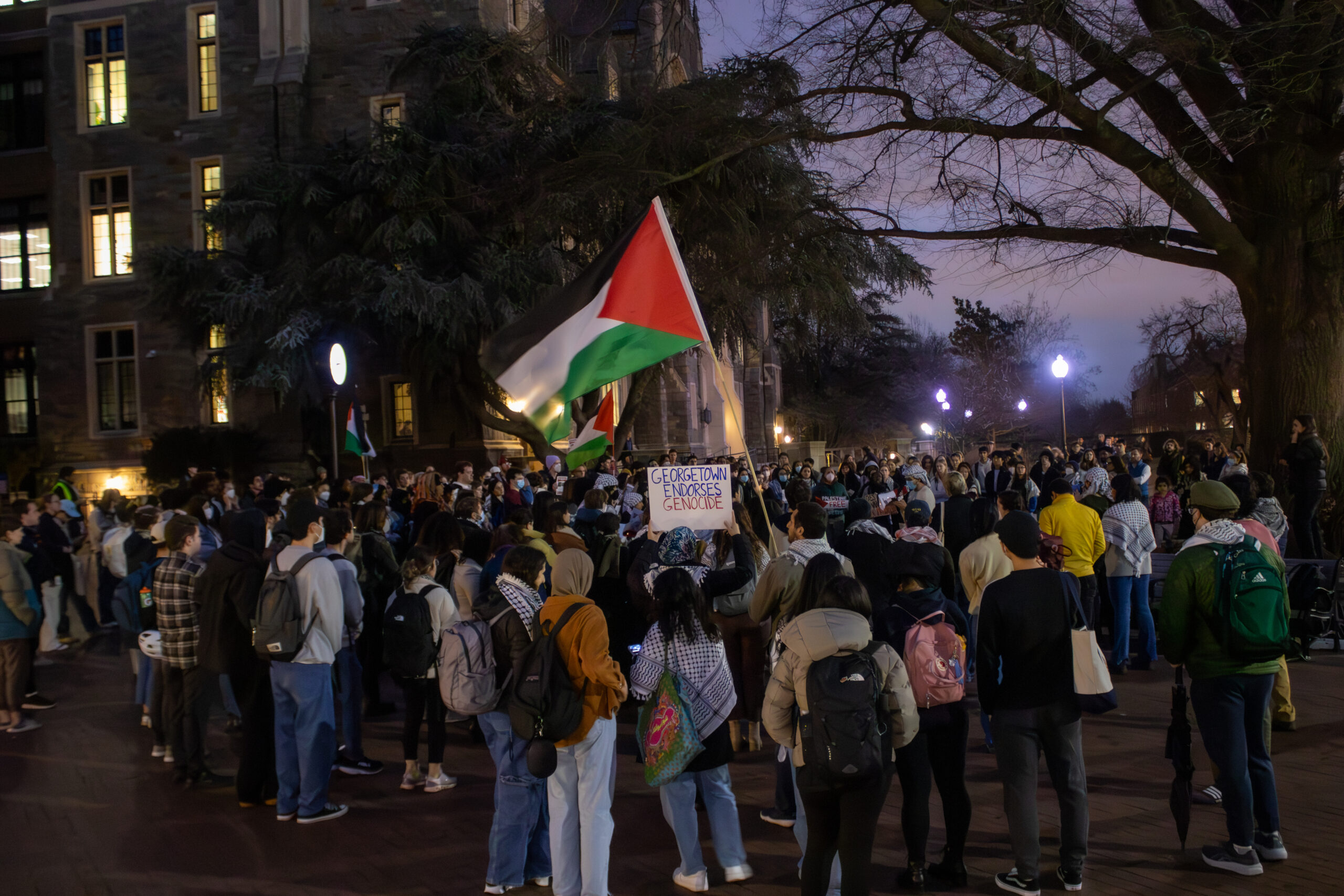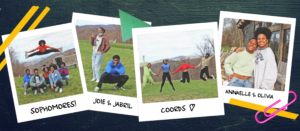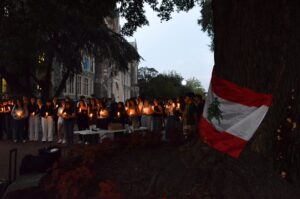Content warning: This article contains mention of anti-Palestinian racism, antisemitism, genocide, self-immolation, and lynching.
Over 250 protesters gathered on Feb. 27 as Jewish Life, a branch of Campus Ministry, and the Georgetown Israel Alliance (GIA) hosted a panel with members of the Israel Defense Forces (IDF). The protest was sparked by the decision to bring IDF soldiers to campus amid Israel’s ongoing occupation and war in Gaza, which experts, including top UN officials, have called a genocide.
On Oct. 7, Hamas militants attacked Israel, killing 1,200 Israelis and taking at least 250 hostages. Following the attack, Israel invaded Gaza and began a series of airstrikes which have killed 30,000 Palestinians and displaced 1.7 million more.
The Feb. 27 protests began in Red Square at 6 p.m. and were organized by members of Students for Justice in Palestine (SJP), Jewish Voice for Peace (JVP), Faculty and Staff for Justice in Palestine (FSJP), and Zeytoun, a graduate student organization that advocates for decolonization in southwest Asia and North Africa. The protesters marched to the Rafik B. Hariri Building at approximately 7 p.m. to chant outside the event, which began at that time, while others protested inside.
The panel featured three current or former IDF soldiers: Noam Kara (who works at Campus Ministry as the Jewish Agency Israel Fellow), Benaya Cherlow, and Avi Eisen.
Rabbi Daniel Schaefer, the interim director for Jewish Life, opened the panel by addressing the approximately 60 attendees, saying that the event provided a space for Jewish students to hear Israeli perspectives on campus, something he feels is lacking.
“Our goal for the event was to create a small, intimate space for the Jewish community to hear from Israelis who have been serving in the military, both before and after Oct. 7; to learn about their experiences and what it means to be an Israeli in this moment,” Schaefer said in an interview with the Voice.
Within Georgetown’s Jewish community, reception to the panel was mixed. For some, it provided the opportunity to feel a sense of unity and connection to each other.
Nicole Horne (MPP ’25) approached Jewish Life with the idea for the panel a few weeks ago.
She recalled several attendees coming up to her after with tears in their eyes to tell her how much the event meant to them.
“They were crying and were like, ‘Thank you so much for doing this, it’s been really hard and this is so nice,’” Horne said. “One of them even texted me today to say thank you for doing the event and creating that space.”
Others felt that the event and Schaefer’s endorsement neither represented their religious values nor made them feel accepted in Georgetown’s Jewish Life.
“I understand that GIA has the right to bring in whatever speakers they would like. I do not believe it is the place of Jewish Life in any way to be involving and affiliating itself with any military,” Miriam Siegel (CAS ’26), an organizer with JVP, said. “It makes Jewish Life feel a lot less safe for me because now my religious space has been conflated with the Israeli military.”
On Feb. 25, Siegel, who registered for the event, received an email from Schaefer asking if JVP helped create social media posts condemning it and promoting the counterprotest. JVP collaborated with SJP and others on the Instagram post. Schaefer encouraged Siegel to distance herself and JVP from the posts, writing that they “are unquestionably antisemitic and in my opinion make Georgetown less safe for Jews.”
“It was really hurtful to hear from my own rabbi that by standing against genocide, I was engaging in antisemitism,” Siegel said. “It felt like a weaponization of my Jewish identity.”
Dylan Taylor (CAS ’26) also received an email from Schaefer on Feb. 25. The email—whose subject line read, “Do you agree with this?”—contained a screenshot of one of the Instagram posts publicizing the counterprotest. The email, which Taylor said was unprompted, surprised him. He did not register for the event.
Taylor said that he had substantial conversations with Schaefer about the conflict in Gaza and saw Schaefer as his rabbi as well as the leader of the campus’s Jewish community.
“I found it inappropriate of him to have reached out, given his position of authority and the very kind of loaded language that he used,” Taylor said. “I find it offensive that he essentially is accusing me of antisemitism because of this event.”
When asked about the email exchanges, Schaefer said that he has tried to create dialogue with people within the Jewish community.
“I’ve tried to engage in conversations with people who disagree, with an understanding that we will probably never see eye to eye on some issues,” Schaefer said. “I hope they know that I always welcome them, I hope they come, and I want to make them feel safe.”
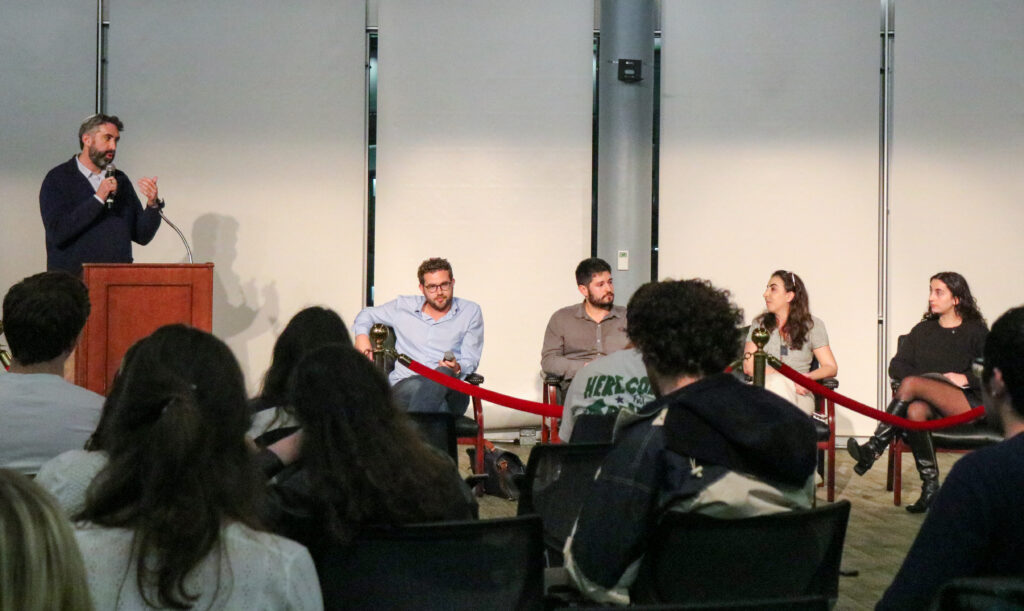 Photo by Eddy Binford-Ross
Photo by Eddy Binford-Ross
Organizers with GIA expressed a similar intention in hosting the event.
“Our overarching goal was to primarily create a space for this perspective, for [the] Jewish and Israeli perspective,” Samantha Yershov (SFS ’25), the president of the GIA, said. “There have been a lot of events on campus and around campus for the past few months and many, many students have been concerned that their voice and their perspective have been underrepresented.”
The panelists discussed a variety of topics, including their experiences surrounding the Oct. 7 attacks by Hamas. Kara reflected on her experience as an Israeli citizen in America at the time.
“The other thing that I experienced and am still experiencing is the hug from the Jewish community here, which was amazing,” Kara said in the panel. “The messages that I got and the events that we’ve thrown together are so meaningful to me.”
Among the several dozen attendees were 13 counterprotesters, all of whom sat in the back rows of the auditorium. The protesters wore keffiyehs and held up their hands, painted red, for the duration of the event. They also held signs opposing the event and turned their backs to the panel during rounds of applause.
On multiple occasions, Cherlow and Eisen directly addressed the counterprotesters inside, as well as those they had seen earlier in Red Square.
Cherlow discussed the counterprotesters and the red paint on their hands. He said protesters did not know the action’s symbolism. Standing at the podium, Cherlow pulled up a photo on his phone of a man who participated in the 2000 lynching of IDF reservists in Ramallah holding up his bloody hands.
Counterprotesters said their choice was not in reference to that event.
“The red paint on the hands has been a pretty common protest strategy in this movement, and in many other movements not specific to Palestine, as a reminder that the speakers—the people in front of us—they have blood on their hands,” Siegel said. The symbol has been used frequently in protests in the last few months, as well as in other anti-war movements.
Cherlow then went on to call the protesters out for wearing keffiyehs, traditional Arab headdresses that can also be worn as a scarf.
“They having keffiyeh, the shawl. They don’t know what is the symbol of this. It’s symbol of Arafat, of Nakba, of terrorism,” Cherlow said.
The black and white variety of the keffiyeh has become a symbol of Palestinian culture, as well as the struggle for a Palestinian state. According to an Associated Press report, the keffiyeh is “not a symbol of ‘Hamas terrorists,’” but of solidarity with Palestine.
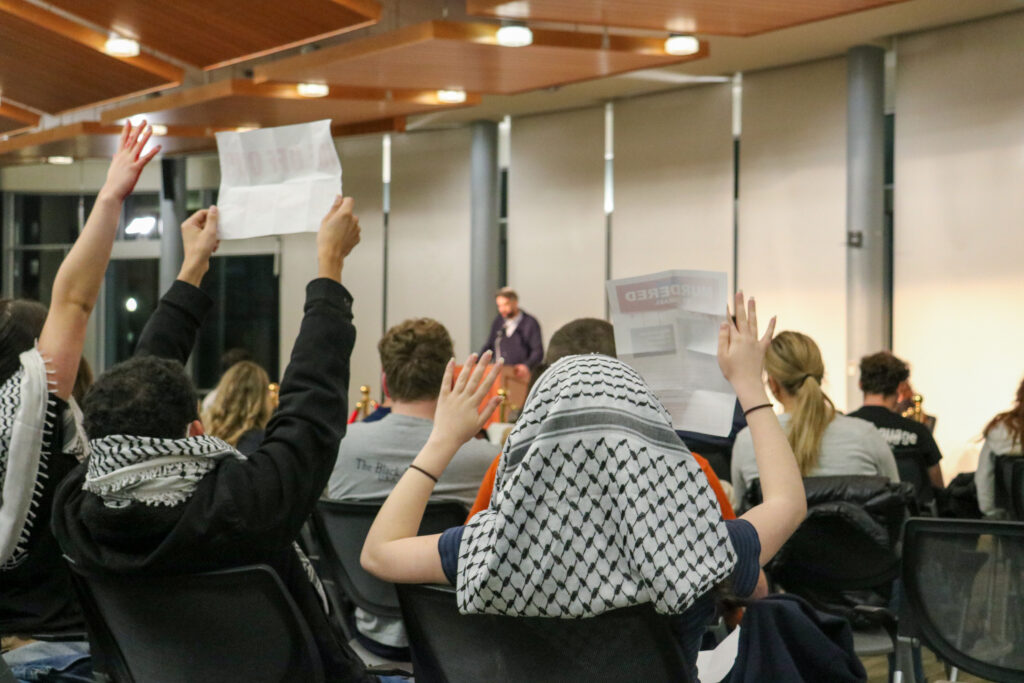 Photo by Eddy Binford-Ross
Photo by Eddy Binford-Ross
Eisen also addressed the protesters in the back of the room, asking if any of them spoke Arabic. He then remarked, in Arabic, that not a single one did—after which a protester shouted an Arabic insult. Eisen continued, saying that the Palestinian people know very well that Jewish people are better for them than Hamas. He also added that if the Muslims would welcome Jewish people, then the war would end, but if not, they were prepared to fight until the end.
He continued in English, “Since all the people raising their hands don’t know what I’m saying—I want peace.”
At this moment and others, counterprotesters said they felt as though Eisen and Cherlow were attempting to shame them.
“Their goal in addressing us is to try and humiliate us and demean us,” Siegel said. “I think that did not work. I personally felt so strong, hearing the groups of people outside chanting.”
Towards the end of the event, counterprotesters began to walk out one at a time. As they left, each shouted phrases, including “Shame!” and “I’m Jewish and I stand for Palestine!”
In an interview with the Voice, an event organizer raised concern that counterprotesters’ actions may have violated Georgetown’s free speech policies. A Student Affairs official present for the event said they believe that none of the conduct violated existing policies on free expression. They said students generally respected the directions given by university officials throughout the evening.
After Jewish Life made a social media announcement about the panel on Feb. 23, student groups organized against the event online. JVP, SPJ, and Zeytoun co-authored one petition, which was signed by over 500 students and alumni as of Feb. 28. The petition called the event “profoundly inappropriate” as well as “dehumanizing and despicable.”
Another petition, signed by 30 Jewish students, alumni, and faculty as of Feb. 28, questioned Jewish Life’s hosting of the panel. The petition said that as a result, the signatories no longer felt represented in Georgetown’s Jewish community.
This online activism culminated in the Feb. 27 rally. During the Red Square portion of the rally, organizers also held a moment of silence for Aaron Bushnell, a U.S. Air Force member who fatally set himself on fire on Feb. 25 at the Israeli Embassy in protest for a free Palestine.
“I am in so much pain that this community that is meant to serve as my home, meant to make me feel safe, is inviting soldiers who could have potentially killed my family,” Selina al-Shihabi (SFS ’26), a Palestinian American organizer with SJP, said at the rally. “I have no words.”
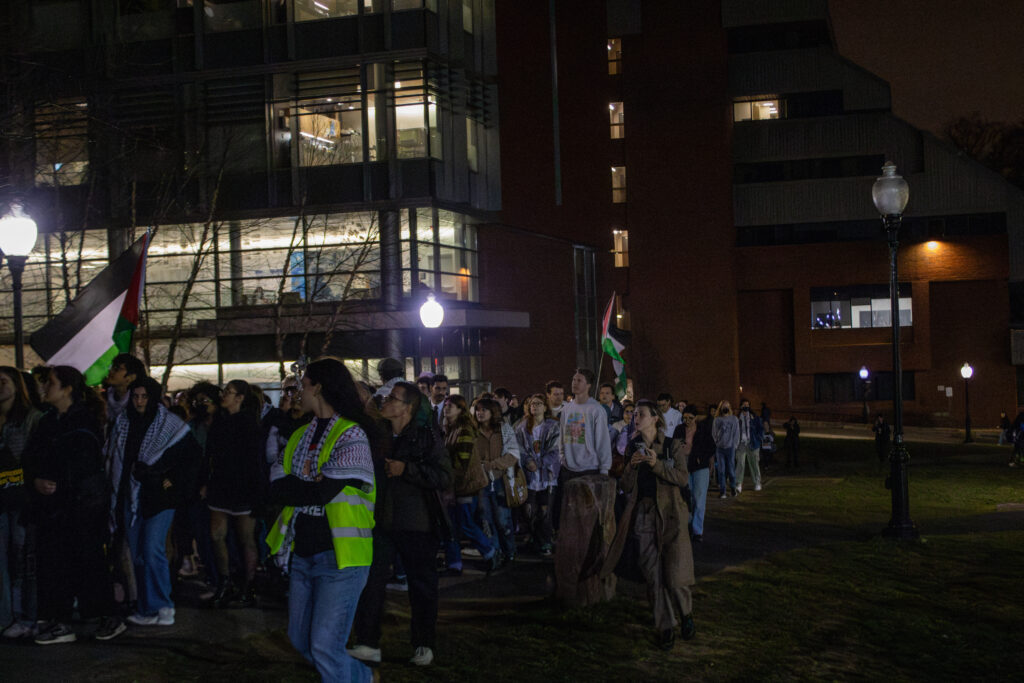 Photo by Connor Martin
Photo by Connor Martin
Echoing the petitions, protesters also decried the involvement of Jewish Life and Campus Ministry during the rally.
“We’re very disturbed that Campus Ministry would invite soldiers involved in active human rights violations to campus,” professor Mark Lance, a member of FSJP, said in an interview with the Voice. “With this specific and immediate event, I would like [the university] to reflect upon and perhaps introduce some procedures for who gets the imprimatur of Campus Ministry.”
During the demonstration outside the Hariri Building, protesters directed their words—like “Israel bombs, Georgetown pays”—toward the building and the event itself. The chants of counterprotesters could be heard inside the event.
GUPD officers stood outside the auditorium and the perimeter of the Hariri Building throughout the protest; at least two were holding fire extinguishers.
“While the majority of protesters acted in accordance with Georgetown’s Speech and Expression Policy, those who received warnings from Georgetown staff members but continued to violate policies were asked to leave. At this time, GUPD has made no referrals to Student Conduct related to Tuesday night’s event,” GUPD chief of police Katherine Perez wrote in an email to the Voice on Feb. 28.
For Palestinian students, the event marked another incident in which they’ve felt unheard by school administrators. Al-Shihabi said the campus she used to call home now feels like anything but.
“All I do is speak and speak and speak about why my humanity and my people should be allowed to simply exist,” al-Shihabi said at the rally. “I no longer feel comfortable on this campus, and this administration does not fucking care.”
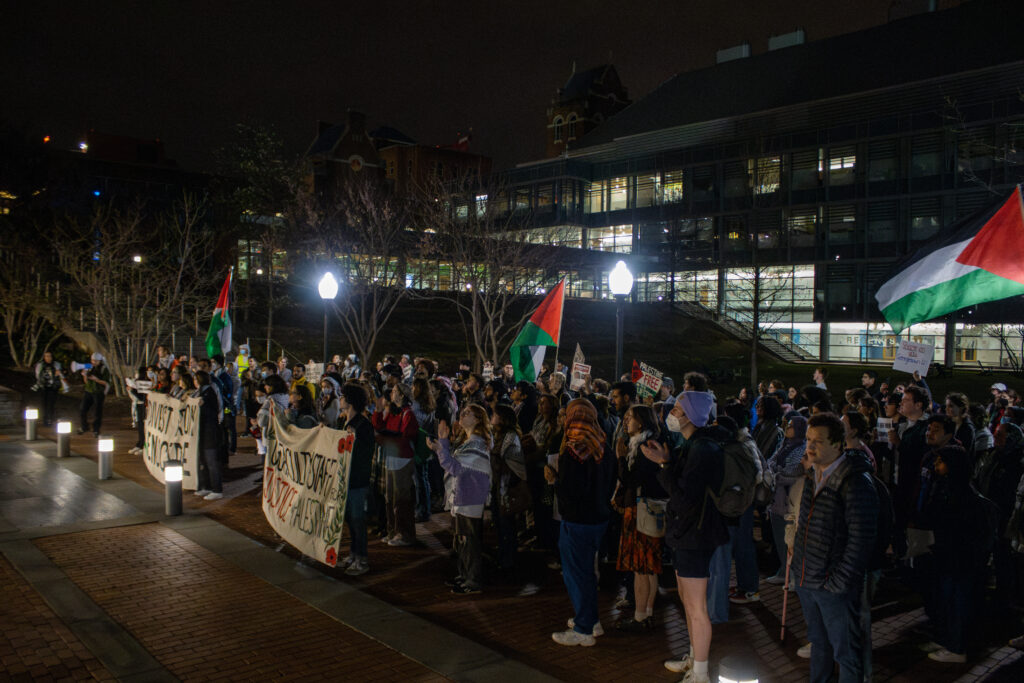 Photo by Connor Martin
Photo by Connor Martin


